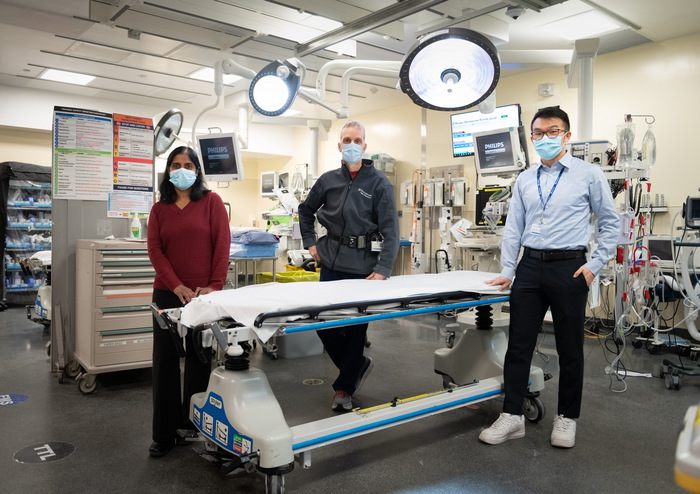Philadelphia, December 12, 2022 – Reasons underlying hesitancy to get vaccinated against COVID-19 may be associated with increased risks of traffic accidents according to a new study in The American Journal of Medicine, published by Elsevier. Researchers found that adults who neglect these health recommendations may also neglect basic road safety. They recommend that greater awareness might encourage more COVID-19 vaccination.

Credit: Sunnybrook Health Sciences Centre
Philadelphia, December 12, 2022 – Reasons underlying hesitancy to get vaccinated against COVID-19 may be associated with increased risks of traffic accidents according to a new study in The American Journal of Medicine, published by Elsevier. Researchers found that adults who neglect these health recommendations may also neglect basic road safety. They recommend that greater awareness might encourage more COVID-19 vaccination.
Motor vehicle traffic crashes are a common cause of sudden death, brain injury, spinal damage, skeletal fractures, chronic pain, and other disabling conditions. Traffic crash risks occur as a complication of several diseases including alcohol misuse, sleep apnea, and diabetes. However, the possible association between vaccine hesitancy and traffic crashes had not been previously studied.
“COVID-19 vaccination is an objective, available, important, authenticated, and timely indicator of human behavior – albeit in a domain separate from motor vehicle traffic,” explained lead investigator Donald A. Redelmeier, MD, Evaluative Clinical Sciences, Sunnybrook Research Institute; Department of Medicine, University of Toronto; Institute for Clinical Evaluative Sciences; and Division of General Internal Medicine, Sunnybrook Health Sciences Centre, Toronto, ON, Canada.
“Whether COVID-19 vaccination is associated with increased traffic risks, however, has not previously been tested. Simple immune activation against a coronavirus, for example, has no direct effect on the risk of a motor vehicle crash. Instead, we theorized that adults who neglect health recommendations may also neglect basic road safety guidelines,” he continued.
Investigators tested whether COVID-19 vaccination was associated with the risks of a traffic crash in Ontario, which is the most populous part of Canada with over 14,500,000 residents in 2021. The yearly crash risk was 2% for an average adult (minor incidents included), minimum driving age was 16 years, and novice drivers initially received beginner licenses. The COVID-19 vaccine became available in winter 2020, doses were widely delivered to adults by spring 2021, and uptake had plateaued in summer 2021. Vaccination was free to all, supported by community outreach, accompanied by public campaigns, and connected to a central registration system.
The investigators conducted a population-based longitudinal cohort analysis of adults and determined COVID-19 vaccination status through linkages to individual electronic medical records. Traffic crashes requiring emergency medical care were subsequently identified by multicenter outcome ascertainment of 178 centers in the region over a one-month follow-up interval.
Over 11 million individuals were included, of whom 16% had not received a COVID-19 vaccine. The cohort accounted for 6,682 traffic crashes during follow-up. Unvaccinated individuals accounted for 1,682 traffic crashes (25%), equal to a 72% increased relative risk compared to those vaccinated. The increased risk was more than the risk associated with diabetes and similar to the relative risk associated with sleep apnea.
The increased traffic risks among unvaccinated adults extended to diverse subgroups (older & younger; drivers & pedestrians; rich & poor) and was equal to a 48% increase after adjustment for age, sex, home location, socioeconomic status, and medical diagnoses. The increased traffic risks extended across the entire spectrum of crash severity and appeared similar for Pfizer, Moderna, or other vaccines. The increased risks collectively amounted to 704 extra traffic crashes.
“The study found traffic risks were 50%-70% greater for adults who had not been vaccinated compared to those who had,” noted Dr. Redelmeier. “These data suggest COVID-19 vaccine hesitancy is associated with significant increased risks of a traffic crash, however, this does not mean COVID-19 vaccination directly prevents crashes. Instead, it shows how adults who do not follow public health advice may also neglect the rules of the road. Misunderstandings of everyday risk can cause people to put themselves and others in grave danger.”
The authors recommend that individuals who hesitate to take the COVID-19 vaccine reflect on their choices and recognize how such decisions have repercussions in ways they do not imagine. “We don’t want unvaccinated people to feel persecuted and are not suggesting they stop driving; instead, we suggest they drive a bit more carefully. Physicians counseling patients who decline COVID-19 vaccination could consider safety reminders so their patients do not become traffic statistics,” Dr. Redelmeier concluded.
Journal
The American Journal of Medicine
DOI
10.1016/j.amjmed.2022.11.002
Method of Research
Data/statistical analysis
Subject of Research
People
Article Title
COVID Vaccine Hesitancy and Risk of a Traffic Crash
Article Publication Date
2-Dec-2022




